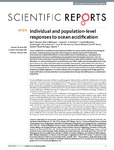Individual and population-level responses to ocean acidification
| dc.contributor.author | Harvey, BP | |
| dc.contributor.author | McKeown, NJ | |
| dc.contributor.author | Rastrick, SPS | |
| dc.contributor.author | Bertolini, C | |
| dc.contributor.author | Foggo, Andrew | |
| dc.contributor.author | Graham, H | |
| dc.contributor.author | Hall-Spencer, Jason | |
| dc.contributor.author | Milazzo, M | |
| dc.contributor.author | Shaw, PW | |
| dc.contributor.author | Small, DP | |
| dc.contributor.author | Moore, PJ | |
| dc.date.accessioned | 2016-03-03T11:11:47Z | |
| dc.date.available | 2016-03-03T11:11:47Z | |
| dc.date.issued | 2016-04 | |
| dc.identifier.issn | 2045-2322 | |
| dc.identifier.issn | 2045-2322 | |
| dc.identifier.other | 20194 | |
| dc.identifier.uri | http://hdl.handle.net/10026.1/4371 | |
| dc.description.abstract |
<jats:title>Abstract</jats:title><jats:p>Ocean acidification is predicted to have detrimental effects on many marine organisms and ecological processes. Despite growing evidence for direct impacts on specific species, few studies have simultaneously considered the effects of ocean acidification on individuals (e.g. consequences for energy budgets and resource partitioning) and population level demographic processes. Here we show that ocean acidification increases energetic demands on gastropods resulting in altered energy allocation, i.e. reduced shell size but increased body mass. When scaled up to the population level, long-term exposure to ocean acidification altered population demography, with evidence of a reduction in the proportion of females in the population and genetic signatures of increased variance in reproductive success among individuals. Such increased variance enhances levels of short-term genetic drift which is predicted to inhibit adaptation. Our study indicates that even against a background of high gene flow, ocean acidification is driving individual- and population-level changes that will impact eco-evolutionary trajectories.</jats:p> | |
| dc.format.extent | 0-0 | |
| dc.format.medium | Electronic | |
| dc.language | en | |
| dc.language.iso | en | |
| dc.publisher | Springer Science and Business Media LLC | |
| dc.subject | Animals | |
| dc.subject | Aquatic Organisms | |
| dc.subject | Female | |
| dc.subject | Male | |
| dc.subject | Models, Biological | |
| dc.subject | Oceans and Seas | |
| dc.subject | Population Dynamics | |
| dc.title | Individual and population-level responses to ocean acidification | |
| dc.type | journal-article | |
| dc.type | Journal Article | |
| dc.type | Research Support, Non-U.S. Gov't | |
| plymouth.author-url | https://www.webofscience.com/api/gateway?GWVersion=2&SrcApp=PARTNER_APP&SrcAuth=LinksAMR&KeyUT=WOS:000368919700001&DestLinkType=FullRecord&DestApp=ALL_WOS&UsrCustomerID=11bb513d99f797142bcfeffcc58ea008 | |
| plymouth.issue | 0 | |
| plymouth.volume | 6 | |
| plymouth.publication-status | Published online | |
| plymouth.journal | Scientific Reports | |
| dc.identifier.doi | 10.1038/srep20194 | |
| plymouth.organisational-group | /Plymouth | |
| plymouth.organisational-group | /Plymouth/Faculty of Science and Engineering | |
| plymouth.organisational-group | /Plymouth/Faculty of Science and Engineering/School of Biological and Marine Sciences | |
| plymouth.organisational-group | /Plymouth/PRIMaRE Publications | |
| plymouth.organisational-group | /Plymouth/REF 2021 Researchers by UoA | |
| plymouth.organisational-group | /Plymouth/REF 2021 Researchers by UoA/UoA07 Earth Systems and Environmental Sciences | |
| plymouth.organisational-group | /Plymouth/Research Groups | |
| plymouth.organisational-group | /Plymouth/Research Groups/Marine Institute | |
| plymouth.organisational-group | /Plymouth/Users by role | |
| plymouth.organisational-group | /Plymouth/Users by role/Academics | |
| dc.publisher.place | England | |
| dcterms.dateAccepted | 2015-12-23 | |
| dc.identifier.eissn | 2045-2322 | |
| dc.rights.embargoperiod | No embargo | |
| rioxxterms.funder | Natural Environment Research Council | |
| rioxxterms.identifier.project | Assessing the effects of long-term ocean acidification at volcanic CO2 vents | |
| rioxxterms.versionofrecord | 10.1038/srep20194 | |
| rioxxterms.licenseref.uri | http://www.rioxx.net/licenses/all-rights-reserved | |
| rioxxterms.licenseref.startdate | 2016-04 | |
| rioxxterms.type | Journal Article/Review | |
| plymouth.funder | Assessing the effects of long-term ocean acidification at volcanic CO2 vents::Natural Environment Research Council |


